‘Cave Sweet Cave?’ Geologist Builds Cozy Abode In Vertical Cliffs In New Mexico… Here’s Why
Authored by Michael Wing via The Epoch Times (emphasis ours),
Was it nuclear holocaust he was expecting? Who in their right mind would spend $20,000 excavating the side of a cliff in a steep valley for a few extra square feet of office space?
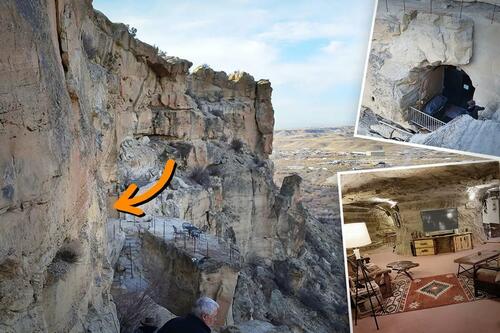
A naval intelligence commander, that’s who. And it was Bruce A. Black who first sketched out the plans for his cave on a bar napkin over a few beers with a pair of miners, the Zink brothers, in 1982.
That napkin plan became the basis for an abode nested in a geologic wonder in a cliff valley of a special type of sandstone—a formation known as Ojo Alamo—located in northwest New Mexico (did we mention Mr. Black was also a geologist?).
It’s also worth asking who planted such a crazy idea in his head. It might not be so crazy after all, for the native ancestral Puebloans of the 12th century once lived here and built the impressive Cave Palace not two hours north.

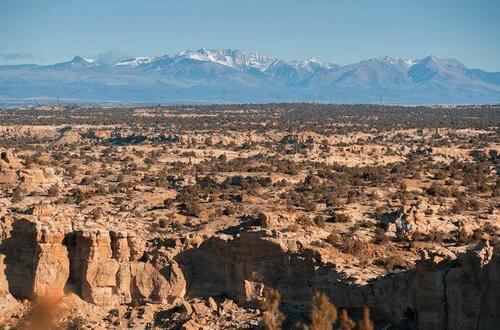
Some theorize that those same Puebloans built their fortress halfway up a cliff, partially sheltered in a cave, to defend against tribal aggressors.
Whether Mr. Black wanted an out-of-the-way office space, a cave fortress, or a nuclear fallout shelter is neither here nor there; it became none of the above in the end. Rather, it became Kokopelli’s Cave—or Koko’s Cave. Although inspired by Puebloan architecture in some ways, it’s now furnished with most of the amenities you’d expect from a cozy bed and breakfast.
So, the Zink brothers used hydro-drilling and blasting to remove stone, carving a donut cavity in the living sandstone. Inside, a large central pillar was left to help hold up the solid rock roof. There was a main opening for a door and a secondary puncture for a balcony with a vista—it overlooks La Plata River valley with a 300-foot vertical drop to the valley floor.
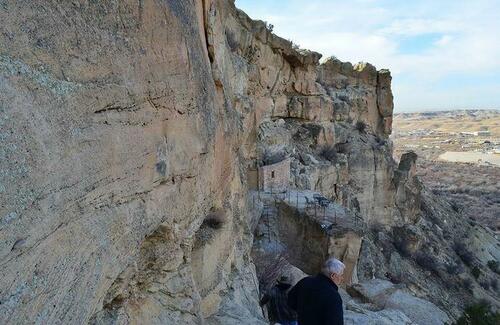
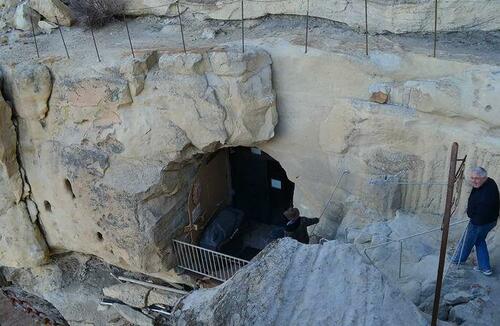
At first, this raw, vacant cavity was unfinished, unfurnished, and unused for years. It turned into a hangout where youngsters partied. It became a blank canvas for vandals, and soon the cave’s interior was covered with graffiti and smoke from bonfires.
Eventually, Mr. Black became fed up and barred the entrance with ¼-inch-thick steel doors, and the place took on the urban legend of some crazy man’s pet project. That is, until 1993.
Time passed. Eventually, Mr. Black’s son returned from his first stint in the Air Force, and he would continue where his father left off. He would make the cave something other than a bunker, office, or cliff palace. It wouldn’t be a home either, but something else entirely.


“Dad decided the logistics of moving his office in were cumbersome, and he abandoned the office effort,” Mr. Black’s son told The Epoch Times. “As an experiment, we moved my fiancé and her dog in it for a year as I began my career as an FBI agent in Las Vegas.”
By 1994, he had the place finished and comfortable for living. After his son got married, Mr. Black made it a bed and breakfast, as it remains today.
It’s comfortable but also a geologist’s dream. The textures are wonderous, for the walls expose the sandstone strata deposited at Ojo Alamo right above the boundary of the last great extinction when the dinosaurs disappeared—in the early Cenozoic period, 65 million years ago.


Inspired by the circular stone hearths the Puebloans once gathered round, called kivas, Koko’s Cave features a mockup construct made of local sandstone with an orno fireplace. There are still many kivas nested throughout Cave Palace today.
Modern comforts were furnished thanks to electrical and other utilities run through a 100-foot shaft drilled to the clifftop above. The hole doubles as a powered venting shaft. Now they have running water for a jacuzzi with a waterfall that serves as a shower. Of course, like any bed and breakfast, there are a kitchenette and laundry facilities.
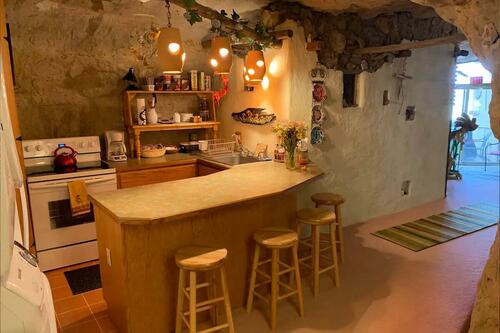
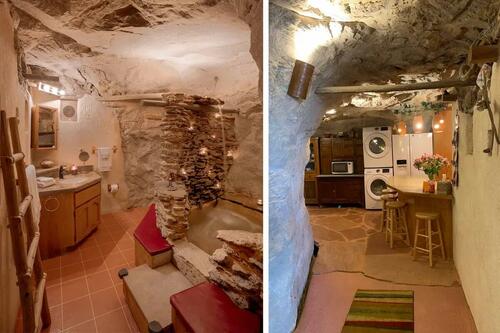
The floor plan is a free-flowing ring of about 1,700 square feet. The bathroom is the only room with an installed wall. Drainage pipes run inside excavated grooves under the floors, traveling to a septic system down in the valley.
“The cave was done on a shoestring,” Mr. Black’s son said. “Fortunately, Mom and my sister picked out excellent colors on the carpet and countertops.
“The cave, due to its natural stone walls, is full of texture, and we deliberately avoided trying to add to it.” They furnished the cave with aspen wood upholstery.
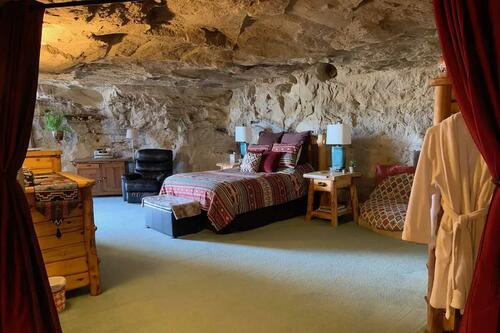

You can visit Koko’s Cave for a holiday, stay in its cozy cave rooms, and marvel on its magnificent view—perhaps as the Puebloans did in the 12th century. The proprietors will meet you at a church parking lot in nearby Farmington. You’ll drive out to the valley and descend a stone path halfway down the cliff to a cozy alcove of an entrance (bring a backpack and avoid cumbersome luggage!).
Farmington is close, so you can run to the grocery store or dine out. You’ll have to leave your pets at home, as the proprietors want to encourage local cute critters—squirrels, chipmunks, ring-tailed cats, and hummingbirds—to come keep visitors company during their stay.
Now, it’s starting to seem much clearer why anyone, whether Mr. Black or the ancestral Puebloans, would want a cliff cave for a domicile. Wouldn’t you agree?
Tyler Durden
Wed, 11/08/2023 – 22:20 Source
Related posts:
Views: 0
 RSS Feed
RSS Feed

















 November 9th, 2023
November 9th, 2023  Awake Goy
Awake Goy  Posted in
Posted in  Tags:
Tags: 
















